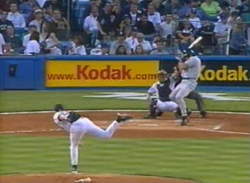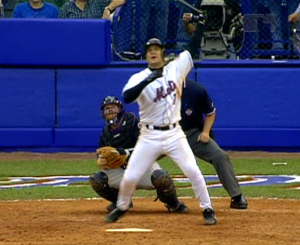Introduction – Page 3
The Mets did chase a championship, however, and wound up constructing a team for the 2000 season with a bit more polish but a lot less amazin’. Knowingly or not, the Mets made it their goal to become the Yankees through Yankee-like means with a Yankee-like concentration on the idea of World Series or bust. And then, ironically, they ran right smack into the immovable object known as The Yankee Dynasty.
Only, it wasn’t quite the Yankee Dynasty yet. This era (roughly 1996-2001) is now cemented in most of our memories as one long unbroken field of excellence stretching out to every horizon. In truth, my research of the 1999 and 2000 seasons shows that the way the Yankees were seen at the time differs wildly from the way those teams are seen now. Their contemporary perceptions have been completely wiped out by a combination of revisionist history and modern-day highlight reel mentality.
Earlier, I mentioned the 1986 Mets, a team that destroyed the competition on its way to a title. In 1998, the Yankees had their own world-beaters, a historically dominant group that leveled everything in its path. Somehow, this once-in-a-lifetime event became not a milestone to be treasured, but the yardstick by which all future Yankees seasons were judged. This being a near impossible standard to live up to, post-1998 teams were inevitably found wanting by their fans, the media, and especially their owner, who was haunted by the memory of playing second fiddle to the Mets in the 1980s. Depending on your perspective, you could call this an uncompromising commitment to excellence, or you could call it god-like hubris to expect such incredible results each year. On top of this unwinnable scenario, it seemed that once a Yankees championship was captured, the team had to turn around and concentrate on winning the next one. No one, least of all the players, had much of a chance to enjoy the fruits of victory in this Sisyphean loop.
 This joyless cycle began to grind on the Yankees, particularly in 2000, when the team was accused of sleepwalking through the regular season. Relatively weak competition in the AL East that year made such an approach possible, and perhaps advisable, and yet the grumbling New York sports media began to make unfavorable comparisons to the Mets, who they considered “hungry” in a way the Yankees had forgotten. Their weariness eventually transformed to resentment, as demonstrated by several ugly incidents between the two teams that season. It culminated in a tense, unsightly World Series in which the Yankees seemed determined to paint the Mets as sacrificial lambs, and the Mets seemed determined to let them.
This joyless cycle began to grind on the Yankees, particularly in 2000, when the team was accused of sleepwalking through the regular season. Relatively weak competition in the AL East that year made such an approach possible, and perhaps advisable, and yet the grumbling New York sports media began to make unfavorable comparisons to the Mets, who they considered “hungry” in a way the Yankees had forgotten. Their weariness eventually transformed to resentment, as demonstrated by several ugly incidents between the two teams that season. It culminated in a tense, unsightly World Series in which the Yankees seemed determined to paint the Mets as sacrificial lambs, and the Mets seemed determined to let them.
Thanks to this victory over the Mets, the Yankees could project their own mythos of Unbridled Triumph, putting forth an idea of a seamless Yankee Dynasty with no wrinkles or complications. Fans would not remember the struggles the Yankees felt, the pressure they felt to live up to impossible standards, or the contempt with which they regarded the regular season in general and their crosstown rivals in particular. They would only remember three championships in a row, and that was that. The dutiful New York sports press would unquestioningly repeat the Yankees Dynasty narrative, to the point where this idea crept into retrospectives that should have been free of such provincial chest-thumping. Ken Burns’ “Tenth Inning” addendum to his Baseball documentary series, for instance, devoted a lengthy segment to the Yankees of the 1990s, yet dispatched the years 1998-2000 in one sentence, as if these seasons were all carbon copies of one another. The Yankees even created their own television network whose enormous swaths of airtime perpetuate this myth to this day. Few have dared question it.
With each passing year, it becomes increasingly difficult to paint a picture of this era free of the weight of accepted narrative. It becomes more and more clouded by the paucity of available contemporary material (game footage being infuriatingly difficult to come by), the cloudy memories of the participants, and the general apathy that settles in when an event has ended and the nostalgia for it is yet to come. If an alternate view of this era could be feasibly presented, it had best be done sooner than later.
Yells for Ourselves seeks to perform that function. It draws exclusively on contemporary sources: archival newspaper and magazine material for the most part, plus audio and video footage of the games in question. It concentrates particularly on the media’s perceptions of New York’s baseball landscape, how those perceptions evolved over the 1999 and 2000 seasons, and how they differ from the way these seasons are presented to us in retrospect. It will place these perceptions in the context of the greater baseball landscape of the time, a sport experiencing unprecedented explosions of home run numbers, salaries, and new stadiums, while also seeing widening gaps between the haves and have-nots. The book takes pains to not project the shadow of future events onto this story, preferring instead to capture the 1999 and 2000 seasons as they were seen at the time—or as much as it is possible to do so in 2012. Roger Clemens, for instance, looms large in this tale, but being reminded of his fall from grace can only cloud a fair depiction of how his reputation evolved during the period examined in this book.
The purpose of Yells for Ourselves is not to argue for some sort of Mets Exceptionalism. This book hopes to prove that a work just like it could (and maybe should) be written about any other team. That includes the teams examined by this book, which is not meant to be the last word on this era, but a word. If more words on this era emerge in the future, then it will have succeeded.
 Yells for Ourselves puts forward the idea that our enjoyment of baseball is not a zero-sum game with only one winner, and so we as fans should be able to treasure the memories of teams that have been judged to fail by such perceptions. Celebrating what we can in both the 1999 and 2000 Mets, and taking lessons from their mistakes, is a rejection of the winner-takes-all view of the game. It is an alternate sports history, a recognition that the Mets can and should be judged not by criteria set by any rival on the field or any scribe off of it, but by themselves.
Yells for Ourselves puts forward the idea that our enjoyment of baseball is not a zero-sum game with only one winner, and so we as fans should be able to treasure the memories of teams that have been judged to fail by such perceptions. Celebrating what we can in both the 1999 and 2000 Mets, and taking lessons from their mistakes, is a rejection of the winner-takes-all view of the game. It is an alternate sports history, a recognition that the Mets can and should be judged not by criteria set by any rival on the field or any scribe off of it, but by themselves.